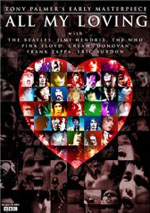|
Tony Palmer's masterpiece about the dawn of the 60's...

'All My Loving' is that rare commodity, a late 60's film that has both stood the test of time and has grown in stature over the years. Not only do the thoughts of McCartney, Zappa, Townshend, Burdon and to a lesser extent those of Hendrix and Donovan strike a chord 40 years on, but it was Tony Palmer's ability to elicit these views in the first place, and extend a public space to the new generation of musicians, that makes a lasting impression. As he explains in an excellent interview at the end of the DVD, he inadvertently got the help of John Lennon three years after initially meeting him. A fortuitous phone call provided the necessary catalyst for a film that admirably captures the late 60's era.
Not only does Palmer's even handed production successfully adopt the objective high ground, but he also achieves the film equivalent of what George Martin calls the 'patchwork quilt' approach to music making. In Palmer's hands the words, music and views of the leading musical figures of the time ring crystal clear. Better still, he manages to handle the politics of the time with candour, balance and a fair degree of sympathy. He also unravels some surprising views from Eric Burdon who is as controversial and perceptive as his musical performance of 'Good Times' is adroit.
McCartney comes out with the oft quoted line, 'Pop music is the classical music of our time' while Zappa noted how the Mothers of Invention were 'in a low key war against apathy'.we annoy people to the point that they might for a second question their environment enough to do something about it.'. The fact that his filmed quote is juxtaposed between a piece about rock's noise pollution, and Eric Burdon talking about the change that LSD brought in rock music, makes it all the more interesting.
The core of the film is predicated on the fact that this was the first time the BBC had given a platform to the new musical vanguard to express themselves outside of the usual cut away cliché's. And in that connection the excellent accompanying interview between Tony Palmer and Jon Kirkman, could almost have been editing in at the beginning of the film to give it a historical and cultural context. As it is, it's an interesting postscript that belatedly answers many of the little questions that pop up along the way.
Also refreshing is the extended musical clips of Cream, Pink Floyd, Hendrix and Eric Burdon, As well as some great film clips of the Fab 4, their press agent Derek Taylor in Peter Cooke mode, and a tour bus interview with a very young and astute Pete Townshend. Townshend saw his band's role as being to 'play out all the adrenalin and aggression and show the audience that you are a frustrated character, that you do want to get something out of your system and you do want to do it in front of them'. He concludes that it is 'much much more to do with art and music than people imagine, much more to do with pop music than anything else.'
In his largely successful attempt to find a balance between the new era and the representatives of the status quo, Tony Palmer uses the occasional talking head such as Tin Pan Alley publisher Eddie Rodgers, who still couldn't get over the fact that Tommy Steele has been regarded as the number one guitarist. His was staggered not by Tommy's poor playing ability but rather by the fact that he couldn't play at all and that this kind of hype had been going on for 15 years.
If nothing else 'All My Loving' successfully provided a public outlet for a new generation that could both play superbly well and eloquently express their views about the world. The ultimate irony of the film is that Tony Palmer provided the BBC with exactly the kind of documentary that fitted the corporation's ideal of being 'A window on the world' at the time. The fact that it was subsequently shelved for 6 months spoke both volumes about the Beeb and the new generation of artists that they found so difficult to accommodate.
*****
Review by Pete Feenstra

|

